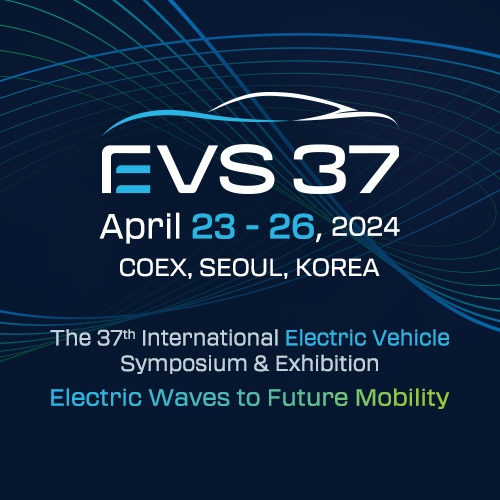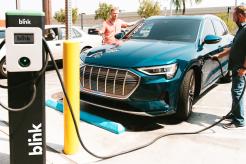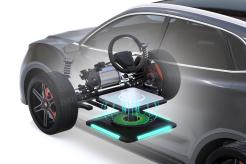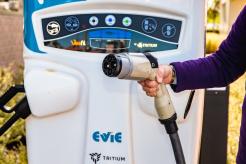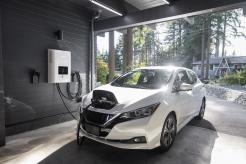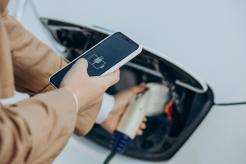Although many major gas station chains have jumped into the EV charging market feetfirst, others, most notably ExxonMobil, have yet to catch the EV wave. One of the reasons, as CNN’s Matt McFarland points out, could be the exorbitant demand charges their electricity suppliers levy on customers who consume a lot of power in a short timeframe.
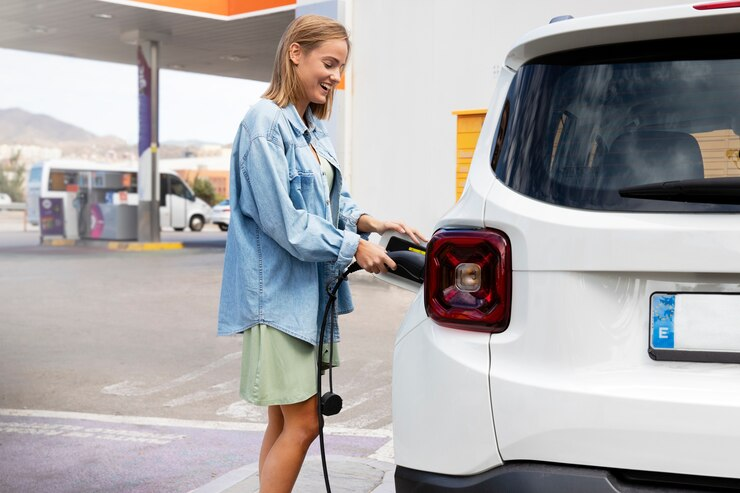
Image via Freepik
Charging EVs does exactly that – so gas station owners need to find a workaround to accommodate their EV-owning customers and grab their share of their convenience store purchases. After all, convenience store purchases make up the bulk of a station’s profits.
However, workarounds exist, including battery backups and partnerships with utility companies. Gas station chains that have used them have experienced profitable results. Here are some of the chains – national and regional – that have made it work.
Kum and Go
As McFarland’s article pointed out, this Colorado-based chain partnered with utility companies across the state to procure electricity at affordable rates. That partnership has paid off in spades, allowing the company to fuel both EVs and combustion engine vehicles. And, to offer even more fueling options, the chain also sells diesel and compressed natural gas. It’s a genius move – one that makes a Kum and Go station the place to refuel no matter what type of vehicle a customer drives.
BP
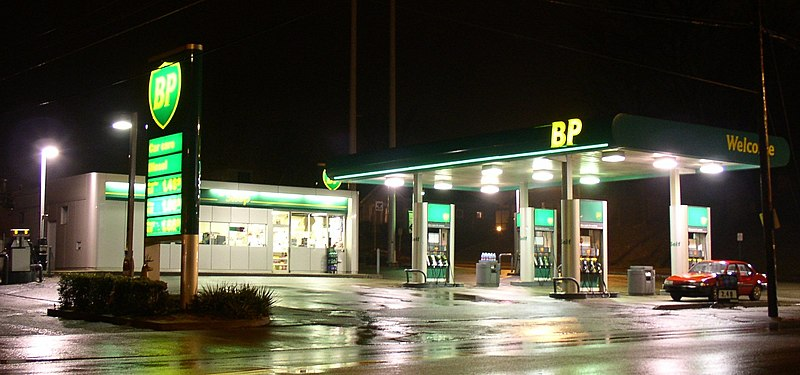
Image via Wikimedia Commons
After a successful rollout of 27,000 charge points, BP revealed that it had ordered $100 million in Tesla ultra-fast chargers to add to its network. The company’s October 2023 announcement revealed BP’s plans to invest $1 billion into EV charging technology nationwide by 2030. BP plans to begin rolling out the Tesla chargers in 2024, building up to an estimated 100,000 chargers worldwide by 2030.
The new chargers will appear across the brand’s “bp pulse” network, including not only BP stations but also at Amoco, ampm, Thorntons, TravelCenters of America, and Gigahub™ EV charging stations. The new chargers will sport the new Tesla dock, allowing cars with both NACS and CCS connectors to charge up hassle-free.
Buc-ee’s
With today’s longer-range EVs, Texas drivers can roam the wide-open spaces of their home state with confidence that they won’t run out of range before they find a charging station. To take advantage of the extra business EVs bring to the table, Texas-based Buc-ee’s has partnered with the Mercedes-Benz EV charging network to expand Buc-ee’s growing collection of EV chargers.
Beginning in November 2023, Mercedes installed chargers in several locations in Texas, Alabama, Georgia, and Florida, with plans to install more in 2024. These charge points join Buc-ee’s already-existing network of Tesla Superchargers in 24 locations throughout the Southeast. Before its partnership with Mercedes, Buc-ee’s also installed CCS/SAE and CHAdeMO chargers in several locations.
Phillips 66

Image via Wikimedia Commons
As iconic as the road it took its name from – the historic Route 66 — the Phillips 66® gas station chain has expanded its reach into the EV charging market. Stocking its stations with “state-of-the-art ultra-fast EV chargers,” the gas station retailer promises its customers a “full charge in as little as 30 minutes.”
Tesla owners, too, can charge their cars at Phillips 66 stations, provided they bring along a Tesla charger adapter cable. Customers can pay at a Phillips 66 charging station with either the EV Connect app.
Pilot
In early December 2023, Pilot launched its first 17 EV charging locations, as PC Mag’s Emily Price reports. As part of its long-term plans to install 2,000 charging stalls in 500 of its travel plazas across the US, this launch resulted from a partnership among Pilot, GM, EVGo, and the US Department of Transportation.
The company hopes to have charging stations in 200 locations by year’s end 2024. Customers can locate the stations using several apps, including the Pilot myRewards Plus, PlugShare, EVgo, and the GM vehicle app.
Like Pilot’s gas pumps, the company’s pull-through EV chargers also feature a canopy to shelter EV drivers from inclement weather. The pull-through design “accommodate[s] EV towing and allows drivers to access free WiFi while they charge,” Price said. In 2024, Pilot will launch a program to provide GM drivers with discounts and advance charger reservations, thanks to their initial partnership with the carmaker.
Shell
Shell got into the EV game relatively early when it acquired Greenlots, a West Coast EV charging infrastructure provider, in 2019, according to a Good News Network report. Beginning with its first US EV charging station at Boston’s Logan Airport, Shell has expanded its charging network to meet increasing demand from US electric vehicle drivers.
The company’s European branch, Royal Dutch Shell, launched its EV network even earlier, in 2017, when it acquired EV charging company NewMotion. With that acquisition, it took ownership of 30,000 charging nodes capable of serving more than 80,000 EV owners.
Chevron
The Good News Network article also highlighted Chevron for its efforts to add EV chargers to its gas stations. In 2019, the company launched the first of its EV chargers at five California gas stations in partnership with EVgo. Chevron plans to expand its network into “major metropolitan areas” to meet the growing demand for conveniently located EV charging stations.
Sheetz
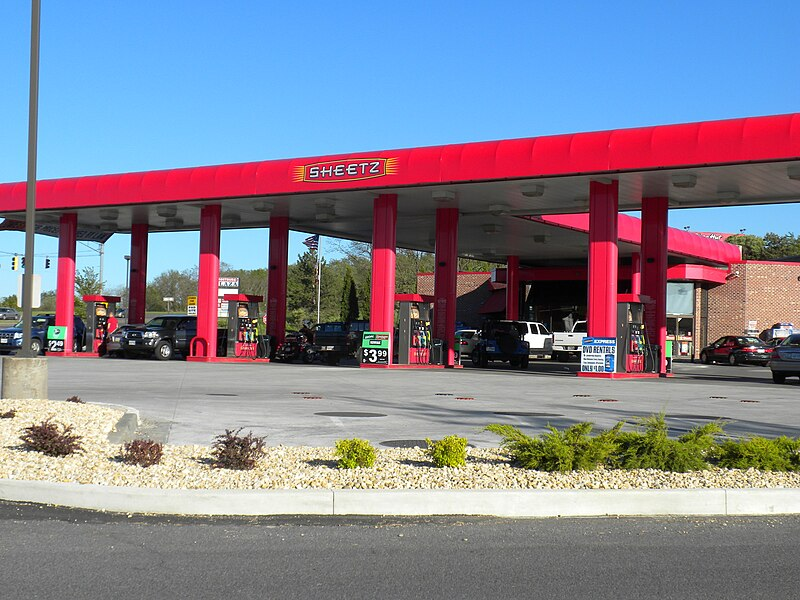
Image via Wikimedia Commons
A one-stop-shop for food and fuel, Sheetz was one of the first US gas station retailers to install EV chargers at its stores. Since the launch of its first EV charger in 2012, the company now has 650 EV chargers in 95 locations.
In April 2023, the chain announced that it surpassed 2 million charging sessions. Not content to rest on its laurels, Sheetz plans to expand its EV charging network to even more locations. With around-the-clock charging and a bevy of fast foods available 24/7, Sheetz will likely become a favorite fueling stop for EV owners across the central Mid-Atlantic states and the Midwest.
EV Charging Must Charge Forward as EV Adoption Increases
As Electrek’s Michelle Lewis points out, gas station retailers need to plan to meet the increasing demand for EV charging across the country. With commercial EV fleets entering the picture in greater numbers than ever before, gas station companies need to rise to the challenge and find solutions to the costs and business disruptions that installing EV charging stations could give rise to.
Instead of looking at the short-term hassle that installation brings with it, gas station owners need to copy Sheetz’s model to offer not only EV charging but more amenities as well, as a 2021 McKinsey report advised. With EV owners’ need for activities that take up the half-hour they need to charge their cars, stations should consider stocking their stores with groceries, fast-food offerings, entertainment options, postal services, and even minor car repair services.
Learn more about the opportunities that await you when you expand your gas station’s fueling options to include EV charging at the next EV Charging Summit event. There, you’ll discover new charging technologies, information about how to fund your venture, and so much more. Register for your place at the table today!

